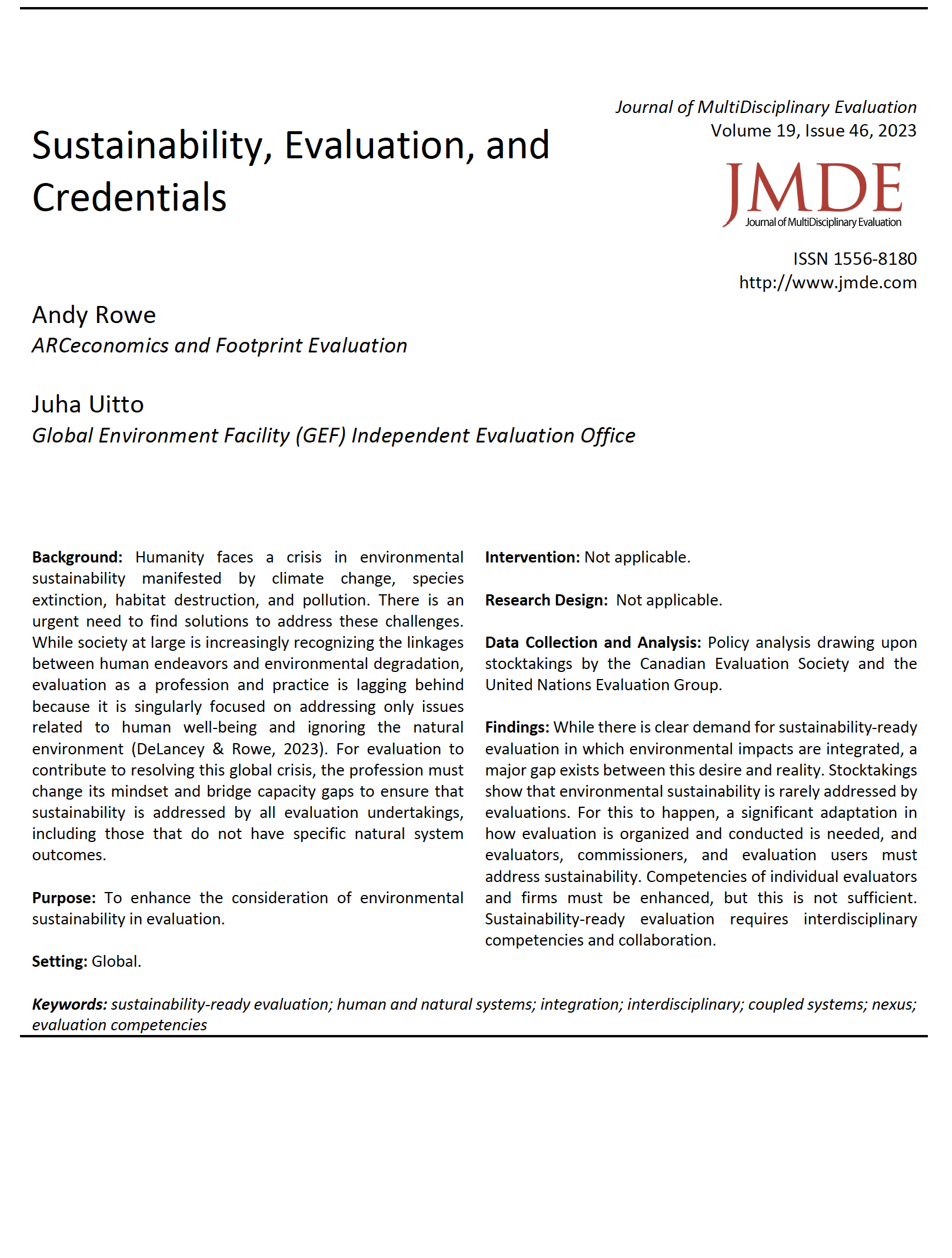Sustainability, Evaluation, and Credentials
Main Article Content
Abstract
While there is clear demand for sustainability-ready evaluation in which environmental impacts are integrated, a major gap exists between this desire and reality. Stock takings show that environmental sustainability is rarely addressed by evaluations. For this to happen, a significant adaptation in how evaluation is organized and conducted is needed, and evaluators, commissioners and evaluation users must take an interest in sustainability. Competencies of individual evaluators and firms must be enhanced, but this is not sufficient. Sustainability-ready evaluation requires interdisciplinary competencies and collaboration.
Downloads
Article Details

This work is licensed under a Creative Commons Attribution-NonCommercial 4.0 International License.
Copyright and Permissions
Authors retain full copyright for articles published in JMDE. JMDE publishes under a Creative Commons Attribution-NonCommercial 4.0 International License (CC BY - NC 4.0). Users are allowed to copy, distribute, and transmit the work in any medium or format for noncommercial purposes, provided that the original authors and source are credited accurately and appropriately. Only the original authors may distribute the article for commercial or compensatory purposes. To view a copy of this license, visit creativecommons.org
References
Canadian Journal of Program Evaluation (2013, 2014). Volumes 28 and 29 Special Issues on competencies and professionalization. https://evaluationcanada.ca/issues-and-articles DOI: https://doi.org/10.3138/cjpe.0028.006
Clark, W.C., Mitchell, R.B. & Case, D.W. (2006). Evaluating the influence of global environmental assessments. In: R.W. Mitchell (Ed.) Global environmental assessments: Information and influence, pp. 1–28. Cambridge, MA: MIT Press.
Clark, W.C., Tomich, T.P., van Noordwijk, M., Dickson, N.M., Catacutan, D., Guston, D. & McNie, E. (2010). Toward a general theory of boundary work: Insights from the CGIAR’s natural resource management programs. HKS Faculty Research Working Paper Series RWP10-035, John F. Kennedy School of Government, Harvard University. DOI: https://doi.org/10.2139/ssrn.1676287
DPME (2022). Guidelines for applying the climate and ecosystems health criterion in the commissioning, design and implementation of evaluations. DPME Evaluation Guideline 2.2.2222. Department of Planning, Monitoring and Evaluation. Republic of South Africa.
EvalSDGs (2022). Mainstreaming environmental sustainability in evaluation. EvalSDGs Insight #14. https://evalsdgs.org/2022/07/21/evalsdgs-insight-14-mainstreaming-environmental-sustainability-in-evaluation/
Footprint Evaluation (2021) Key Evaluation Questions. https://www.betterevaluation.org/en/resources/key-evaluation-questions-keqs-guide-footprint-evaluations
GCA (2019). Adapt now: A global call on leadership in climate adaptation. Rotterdam: Global Commission on Adaptation. https://gca.org/reports/adapt-now-a-global-call-for-leadership-on-climate-resilience/
GEF IEO (2017). Formative review of the integrated approach pilot programs. Washington, DC: Global Environment Facility Independent Evaluation Office. https://www.gefieo.org/evaluations/iaps-2017
GEF IEO (2021). Formative evaluation of the GEF integrated approach to address the drivers of environmental degradation. Washington, DC: Global Environment Facility Independent Evaluation Office. https://www.gefieo.org/evaluations/environmental-degradation
Goodrich, K.A., Sjostrom, K.D., Vaughan, C., Nichols, L., Bednarek, A. & Lemos, M.C. (2020). Who are boundary spanners and how can we support them in making knowledge more actionable in sustainability fields? Current Opinion in Environmental Sustainability, Volume 42, 2020, pp. 45-51, https://doi.org/10.1016/j.cosust.2020.01.001 DOI: https://doi.org/10.1016/j.cosust.2020.01.001
IFAD IOE (2020). Thematic evaluation of IFAD’s support to smallholder farmers’ adaptation to climate change. Rome: International Fund for Agricultural Development Independent Office of Evaluation. https://ioe.ifad.org/en/w/thematic-evaluation-of-ifad-s-support-to-smallholder-farmers-adaptation-to-climate-change
Nanthikesan, S. (2021). Averting a ‘train wreck’ – Taking stock of environmental consequences of development interventions. Earth-Eval (February 11). https://www.eartheval.org/blog/averting-%E2%80%98train-wreck%E2%80%99-%E2%80%93-taking-stock-environmental-consequences-development-interventions
Rowe, A. (2013). A good start, but we can do better. Canadian Journal of Program Evaluation, 28(3), 121-126. https://evaluationcanadabca/canadian-journal-program-evaluation/volume-28-2013/special-issue DOI: https://doi.org/10.3138/cjpe.0028.011
Rowe, A. (2019). Sustainability-ready evaluation: A call to action. In G. Julnes (Ed.), Evaluating sustainability: Evaluative support for managing processes in the public interest. New Directions for Evaluation, 162, 29– 48. DOI: https://doi.org/10.1002/ev.20365
Rowe, A. (2021). Evaluation at the nexus: Evaluating sustainable development in the 2020s. In: J. I. Uitto (Ed.) Evaluating environment in international development, pp. 46-60. Second edition. London: Routledge. https://www.taylorfrancis.com/chapters/oa-edit/10.4324/9781003094821-4/evaluation-nexus-andy-rowe?context=ubx&refId=5dfb1ee6-7bd0-4b31-b1e6-d270bbc230fa
Rowe, A. & DeLancey, D. (2021). Mainstreaming Sustainability in Evaluation: Canadian Evaluation Society Stocktaking Report. European Evaluation Society blog July 12 2021. https://europeanevaluation.org/2021/07/12/mainstreaming-sustainability-in-evaluation-canadian-evaluation-society-stocktaking-report/
Räkköläinen, M. & Saxén, A. (2022). Pathway to the transformative policy of Agenda 2030: Evaluation of Finland’s sustainable development policy. In: J. I. Uitto & G. Batra (Eds.) Transformational change for people and the planet: Evaluating environment and development, pp. 2387-249. Cham, Switzerland: Springer. https://link.springer.com/chapter/10.1007/978-3-030-78853-7_16 DOI: https://doi.org/10.1007/978-3-030-78853-7_16
Swilling, M. H. (2018). The weight of cities: Resource requirements of future urbanization. Nairobi: International Resource Panel. United Nations Environment Programme. https://www.resourcepanel.org/reports/weight-cities#:~:text=We%20have%20a%20once%2Din,resource%2Defficient%2C%20inclusive%20cities
Todd, D. (2022). Incorporating environmental considerations into UNEG member agency evaluations. Earth-Eval (March 8). https://www.eartheval.org/blog/incorporating-environmental-considerations-uneg-member-agency-evaluations
UNEG (2021). Stock-taking exercise on policies and guidance of UN agencies in support of evaluation of social and environmental considerations. United Nations Evaluation Group. http://unevaluation.org/document/detail/2951
UNEP (2021). The heat is on: A world of climate promises not yet delivered. Emissions gap report 2021. Copenhagen: United Nations Environment Programme. https://www.unep.org/resources/emissions-gap-report-2021

